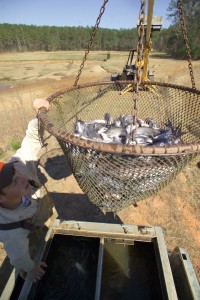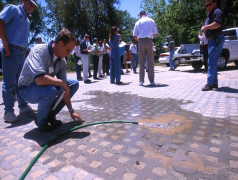Post contributed by Dr. Nanette Chadwick, Director of Academic Sustainability Programs, Office of the Provost.

School of Fisheries conducts research on aquaculture.
Every 3 years, Academic Sustainability Programs creates an inventory of all sustainability-related teaching and research on campus, as part of a national assessment program. Together with the Office of Sustainability, we submit information to the Association for the Advancement of Sustainability in Higher Education (AASHE), for the Sustainability Tracking Assessment and Rating System (STARS). In 2013, Auburn was awarded a Silver rating based on our entries.
Again this fall, our program has been gathering information for our next submission to STARS, which will be assessed in early 2016. We are hoping to “go for the gold” and receive a Gold rating this year, but if Auburn remains at Silver level we will still be in good company with many peer institutions across the country.
Some interesting information has emerged from our updated assessment this year. The recorded number of faculty at Auburn who are engaged in current research projects related to sustainability has almost doubled in the past 3 years, from 71 faculty total during the initial assessment period of 2010-12, to at least 124 faculty engaged during the past 3 years (2013-15). This large increase includes major jumps in the engagement of faculty in almost all colleges on campus. The colleges with the largest number of faculty engaged in sustainability-related research are Sciences and Mathematics, Agriculture, and Engineering, with Liberal Arts and Forestry and Wildlife close behind.
Faculty are engaged in a wide variety of interesting projects; for a complete listing, see the inventory files.
Sustainability research at Auburn is expected to increase even further in the coming years, as we embark on a Faculty Cluster Hire initiative that will bring in more faculty engaged in interdisciplinary research programs. These include the important areas of scalable energy conversion, the linkages between climate and human systems, and heath disparity issues in social justice.

The McWhorter School of Building Science tests and demonstrates pervious pavement.
Some of the recent increase in apparent research activity on campus may be due in part to our initial inventory not having captured all or even most of the faculty research activity in certain units, although our program employed a variety of information-gathering techniques. As such, some of the reported increase may be due to the greater awareness, communication, and visibility of sustainability research on campus over the past few years. Some also is undoubtedly due to a national trend of newer faculty being increasingly aware of and interested in engaging in scholarship related to sustainability, as well as increased funding directed as sustainability by federal agencies.
Regardless of the myriad causes, the increases are encouraging, and indicate a positive trend of Auburn continuing to be a regional leader in the scholarship and generation of knowledge related to important and emerging issues in sustainability.
If you have corrections or further updates for our inventories, please send them to: Dr. Nanette Chadwick.




